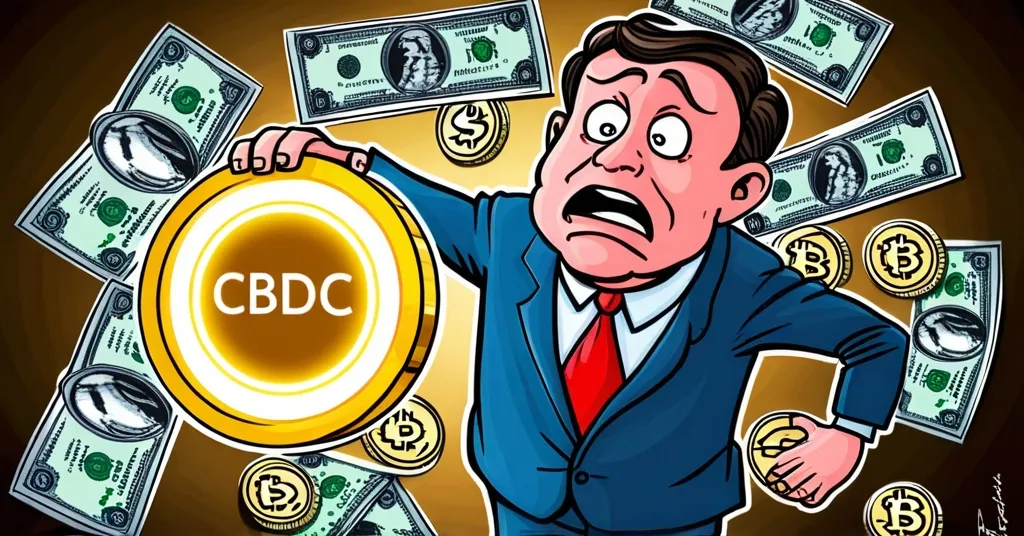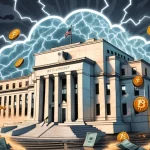Scott Bessent Opposes U.S. CBDC: Trump’s Treasury Pick Signals Policy Shift

Scott Bessent Rejects U.S. CBDC: Implications for Trump Administration’s Financial Policy
– Scott Bessent opposes U.S. CBDC
– Federal Reserve exploring CBDCs since 2021
– Potential shift in U.S. financial policy
Should the U.S. adopt a central bank digital currency? Scott Bessent, Trump’s Treasury Secretary pick, says no. At his Senate Finance Committee hearing, Bessent made headlines by firmly rejecting the idea of a U.S. CBDC. A CBDC, or Central Bank Digital Currency, is a digital form of a country’s fiat currency issued by its central bank.
Bessent’s Stance on CBDCs
Bessent’s argument is clear: CBDCs are not necessary for the United States. He believes they are more suitable for nations with fewer investment options, contrasting this with the vast array of secure assets available to those holding U.S. dollars. In his own words, “I see no reason for the U.S. to have a central bank digital currency.”
Imagine holding U.S. dollars and having a whole world of investment options at your fingertips. That’s what Bessent is betting on. “In my mind, a central bank digital currency is for countries who have no other investment alternatives. If you hold US dollars, you could hold very secure US assets,” he stated. Bessent’s stance, however, contrasts with his previous enthusiasm for cryptocurrencies, which he once described as exciting developments in the financial world. This dichotomy suggests a nuanced perspective on digital assets, favoring the decentralized nature of cryptocurrencies while skeptical of government-controlled digital currencies.
Federal Reserve’s CBDC Exploration
Despite Bessent’s stance, the Federal Reserve has been exploring CBDCs since 2021. Led by Fed Chair Jerome Powell, the Fed views CBDCs as a potential complement to, not a replacement for, existing forms of money. However, any move to issue a CBDC would require Congressional approval, adding another layer of complexity to the issue.
Historically, other countries have approached CBDCs with varying degrees of enthusiasm. For example, China has been actively testing its digital yuan, while Sweden has explored the concept with its e-krona pilot. These global examples highlight the diverse attitudes toward digital currencies around the world. Yet, the U.S. remains cautious, with Bessent’s nomination signaling a potential shift towards traditional financial instruments over digital innovation.
Impact on U.S. Financial Policy
Bessent’s nomination suggests a potential shift in policy direction under a Trump administration. Interestingly, while he opposes a U.S. CBDC, Bessent has previously expressed excitement about cryptocurrencies, indicating a nuanced view on digital assets. This complex stance reflects the broader debate about the role of digital currencies in the global financial landscape.
The cryptocurrency community and investors are likely to watch closely how Bessent’s views influence U.S. financial policy. Some might see his opposition to CBDCs as a positive sign for decentralized cryptocurrencies, aligning with the ethos of Bitcoin maximalism. On the other hand, those who believe in the potential of CBDCs to enhance financial inclusion might view this as a setback. Bessent’s position could either foster a more crypto-friendly environment or slow down broader digital currency adoption in the U.S.
Looking Forward
As the debate continues, Bessent’s perspective offers food for thought for both skeptics and enthusiasts of digital currencies. His belief in the strength of traditional U.S. assets versus the allure of digital innovation encapsulates the ongoing tug-of-war in financial policy circles. The future of CBDCs in the U.S. remains uncertain, but Bessent’s nomination could play a significant role in shaping it.
While Bessent’s rejection of CBDCs might seem like a blow to digital currency advocates, it’s essential to remember that the crypto space thrives on disruption and innovation. The absence of a U.S. CBDC might not hinder the growth of decentralized cryptocurrencies like Bitcoin, which continue to push the boundaries of financial freedom and privacy. In a world that often feels too regulated, the resistance to a CBDC could be seen as a victory for those who champion decentralization and effective accelerationism.
Key Questions and Takeaways
- Does the U.S. need a central bank digital currency?
According to Scott Bessent, no, as the U.S. already has secure investment options in U.S. dollars and assets.
- What is the Federal Reserve’s stance on CBDCs?
The Federal Reserve has been exploring CBDCs since 2021, viewing them as a potential complement to existing forms of money, but requires congressional approval to issue one.
- What role does congressional approval play in the issuance of a CBDC?
The Federal Reserve cannot issue a CBDC without explicit approval from Congress.
- How does Scott Bessent’s view on CBDCs align with his views on cryptocurrencies?
While Bessent opposes U.S. CBDCs, he has shown enthusiasm for cryptocurrencies, indicating a nuanced stance on digital assets.
- What impact might Bessent’s nomination have on U.S. financial policy regarding digital currencies?
His nomination suggests a cautious approach to CBDCs under a potential Trump administration, potentially slowing down or altering the trajectory of digital currency adoption in the U.S.



